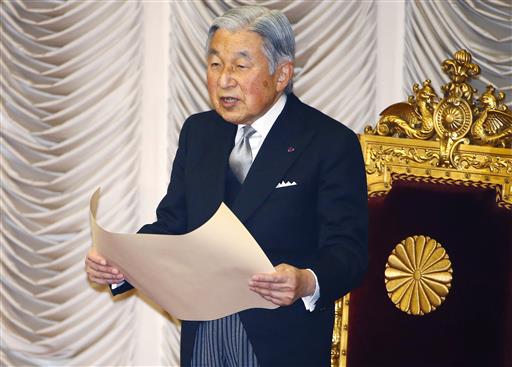Japan emperor to address nation after abdication reports

Japan’s Emperor Akihito is expected to speak to his nation Monday afternoon (August 8, 2016) amid reports that he was looking at giving up the monarchy. AP FILE
TOKYO, Japan — Japan’s Emperor Akihito is set to make a rare address to the nation on Monday in remarks widely expected to signal that the 82-year old monarch wishes to abdicate — something that hasn’t happened in two centuries.
Speculation about the emperor’s future emerged last month with reports he had told confidantes that advancing age was making it harder to perform his ceremonial duties and that he would like to step down in a few years.
After weeks of public denials the palace broke its silence on Friday, announcing that Akihito would make an address on Monday at 0600 GMT about his “feelings regarding his duties as a symbol” of the nation.
Previous emperors, including wartime sovereign Hirohito, were deemed semi-divine but in the aftermath of Japan’s World War II defeat and occupation became constitutionally limited to “symbol of the state and of the unity of the people”.
2nd time only
Article continues after this advertisementThe address, reportedly to last about 10 minutes, marks only the second time for Akihito to speak directly to the nation, the first having been in the days after the March 2011 triple earthquake, tsunami and nuclear disaster as he sought to calm a nation undergoing its worst crisis since the war.
Article continues after this advertisementAkihito will reportedly speak obliquely about his wishes and is unlikely to utter the word abdication due to constraints on his involvement in politics.
But the government is expected to interpret them as meaning his wish is to step down, and then quickly embark on creating the necessary legal measures. Under current law there is no mechanism for the emperor to abdicate.
Prime Minister Shinzo Abe’s government will reportedly issue a statement after the emperor’s speech to clarify its stance.
Unbroken for 2,600 years
The origins of Japan’s monarchy, said to be the world’s oldest hereditary monarchy, are ancient and legend says it is an unbroken line going back some 2,600 years.
It is deeply ingrained in the nation’s native Shinto religion and it comes with numerous ritual duties, including planting rice in a field within the palace grounds.
The speech comes during an annual time of sensitivity in Japan with August being a month of remembrance. Japan commemorated the US atomic bombing of Hiroshima on Saturday and does so again on Tuesday for Nagasaki.
And next Monday, Japan pauses to recall the 71st anniversary of its defeat in World War II, an annual event at which the emperor delivers a speech.
Witness to destruction
Akihito was 11 years old when the war ended and witnessed the destruction it brought to Japan.
He has keenly embraced the role of symbolic sovereign and is credited with making efforts to seek reconciliation both at home and abroad over the legacy of the war fought in his father’s name.
He has ventured to a number of locales that saw intense fighting, including Okinawa at home and Saipan, Palau and the Philippines abroad, making sure to offer prayers for the souls of all the dead, not just Japanese.
Any move by Akihito to step down appears to have wide public support. A survey by Kyodo News last week showed that 85.7 percent of people surveyed were in favour of legal changes that would allow abdication.